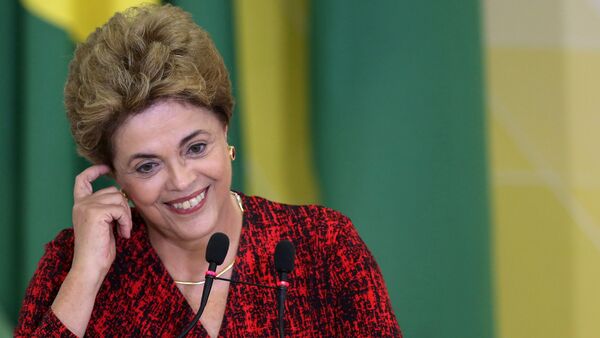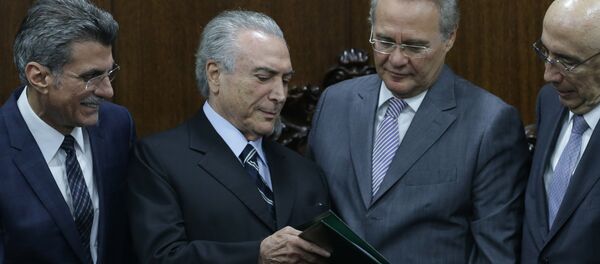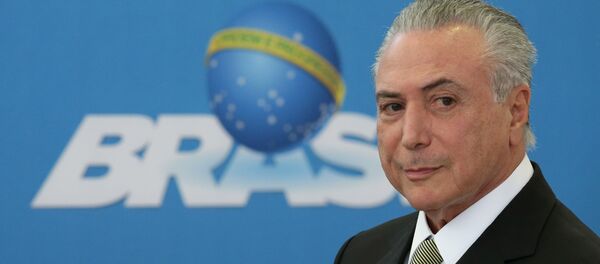A report by independent auditors on behalf of Brazil’s Senate indicates that the impeachment effort against democratically elected Brazilian President Dilma Rousseff is without basis nearly two months after the official was suspended from office for 180 days pending a final vote by legislators.
The justification for the impeachment effort against the Brazilian leader was that she used a budget trick known as pedaladas, or the illegal delay of repayments to state banks, to mask public debt in the lead up to her 2014 presidential election bid. However, the Senate’s expert report concluded that there was “no indication of direct or indirect action by Dilma” to engage in such budgetary malfeasance.
The Associated Press explained that "Independent auditors hired by Brazil’s Senate said in a report released Monday that suspended President Dilma Rousseff didn’t engage in the creative accounting she was charged with at her impeachment trial."
On Tuesday, the top columnist for Brazil’s Folha de Sao Paulo paper, Elio Gaspari, blasted Michel Temer and his Brazilian Democratic Movement (PMDB) allies for staging a legalized mutiny under the title "There is a Coup" while even western media outlets favorable to the agenda of austerity and natural resource pillaging of the interim president are beginning to wonder whether the impeachment was more or less theatrical window dressing for an undemocratic overthrow.
The Early Case for the Allegations of a Coup
Notwithstanding the Brazilian Senate’s expert report vindicating Dilma Rousseff for the primary charge of the impeachment, the process has come under fire for procedural irregularities, rank corruption, and political motivation from the beginning.
The initial vote by the Brazilian lower house was led by Eduardo Cunha, a notoriously corrupt politician exposed in the Panama Papers for using offshore accounts to mask massive kickbacks from the country’s industrial sector and who is believed to have dozens of Swiss Bank accounts for the same purpose.
Indications inside of Brazil are that Cunha bribed his fellow legislators to secure a vote in favor of referring the impeachment proceedings to the Brazilian Senate into the caring arms of PMDB Party ally Renan Calheiros.
This bid was nearly trounced at the last hour when, only days before the Brazilian Senate was set to vote on whether to suspend Dilma Rousseff for 180 days, the Brazilian Supreme Court ousted Eduardo Cunha from his post as leader of the lower house citing pending corruption charges.
Cunha’s replacement, Eduardo Maranhao, moved immediately to annul the lower house impeachment vote which he argued was devastated by procedural irregularities that rendered the vote invalid. Brazilian Senate leader Renan Calheiros pushed back saying the chamber would vote on whether to suspend Dilma Rousseff two days later questioning Maranhao’s jurisdiction to annul an earlier vote.
Maranhao quickly rescinded his call to annul the prior vote for fear of tipping the country into a constitutional crisis and the vote proceeded following a lengthy and absurd debate with 55 senators voting for suspending Dilma Rousseff and 22 voting against sending Brazilians into an uproar.
Leaked Tapes Prove Nefarious Plot to Replace Dilma with Temer
In his first 30 days in office, Michel Temer lost three of his chosen minister to corruption charges including his close ally and President of the Brazilian Democratic Movement Party (PMDB) Romero Juca.
The PMDB leader removed himself from office after Brazil’s largest newspaper Folha de Sao Paulo released a taped conversation between him and construction executive Sergio Machado plotting the impeachment of Dilma Rousseff and installation of Michel Temer in her place as a way to shut down a massive corruption dragnet, the Car Wash Investigation.
One week later, another tape released by Brazil’s O Globo television forced the departure of Temer’s Transparency Minister Fabiano Silveira who was tasked with leading the country’s anti-corruption efforts. The tape featured a conversation Silveira held with Senate President Renan Calheiros and construction executive Sergio Machado wherein the Transparency minister advised the senate leader on how to avoid being charged in the Car Wash corruption probe.
Today the world’s fifth most populous country finds itself hostage to the most corrupt political force in the Western hemisphere, the Brazilian Democratic Movement (PMDB) of Temer, Cunha, Calheiros, Juca, and Silveira all in the name of anti-corruption and all against the will of Brazil’s democratic choice.





